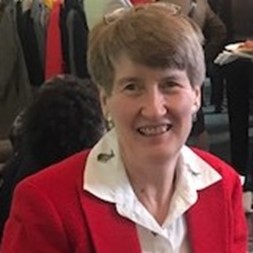Clinical Researcher—April 2022 (Volume 36, Issue 2)
GOOD MANAGEMENT PRACTICE
A Q&A with Tina Barton, PhD, MBA
Dr. Tina Barton, chief operating officer of eMQT in Milton Keynes, England, United Kingdom, is a drug development specialist with more than 40 years of experience driving growth, managing teams, and training for the future in settings that range from large global organizations to small start-up enterprises. She has been a champion for the inclusion of Central Eastern European countries in clinical development projects, and now is focused on Sub-Saharan Africa for the same purposes.
She also is the 2021 winner of the Christine Pierre Clinical Trials Lifetime Achievement Award, named in memory of the late founder and CEO of RxTrials Inc. and the Site Solutions Summit, founder and president of the Society for Clinical Research Sites (SCRS), and 2007 chair of the Association Board of Trustees for ACRP. Managed by mdgroup since 2015 and presented annually at Clinical Trials Europe, the award celebrates the groundbreaking work and contributions of individuals across the field of clinical research.
This Q&A is excerpted from Barton’s talk with mdgroup about winning the award, why clinical research is the “most incredible” global industry to work in, and the importance of diverse skill sets for professionals on clinical trials teams.
Q: Supporting the patient at every stage of his or her clinical trial journey is of benefit to the whole ecosystem. Why are you passionate about working in clinical research?
A: I have spent more than 40 years in this business, and I love it. I’m passionate about it. I have had the time of my life, but I never thought when I left university and got a job in a hospital laboratory that I would end up doing what I have.
Working in clinical research means being able to make a difference to people’s lives. Even though sometimes it might seem small, every contribution is important. One of the positives to come out of the COVID-19 pandemic is that pharma is no longer seen as the “Big Bad Wolf.” For most of my career, publicity mainly portrayed our industry negatively, but I think there is a much bigger population now that understands this industry can really bring value and do good, which is a real asset.
To maintain that positivity, we should always be looking at how we can improve the way we work and attract the very best people to work in our industry. We need to embrace the challenges that creating truly diverse, patient-focused clinical trials brings. As my grandmother used to say to me, there is no such thing as “can’t”—we just haven’t found a way to do it yet.
Q: You mentioned the need to maintain the positive momentum we have built up as an industry over the past two years. How can individuals working in clinical research contribute to this?
A: I am quite disruptive, and I would encourage others to think that way too. I think that, as an industry, we are very slow to change.
Another positive to come out of COVID-19 is we have learned to work differently. Finally, we are changing faster. I really hope that, once this pandemic is deemed to be over, we do not go back into our old ways of being slow to implement change.
Earlier in my career, I was more hesitant about being disruptive, but over the years I have learned that someone has to be first and I am more than happy to be that first person. As an industry, we should focus on what is difficult—whether that is diversifying clinical trials or reaching patients without access to the latest technology.
That is why, for example, I push for Africa to be included in clinical trials. Yes, there are challenges, but just as we adapted to cultural differences and logistical difficulties when we first ran trials in China, or Hungary, or Brazil, we can learn to embrace and accommodate different cultures and work with them in Africa.
It is also important to remember that including African sites in a global programme of clinical trials brings huge benefits for all.
Q: Looking at new markets like Africa, is there any potential for established markets to learn from what is happening there? Can we find new ways of combining human interaction with technological advancement? Can we make both protocols and staff more responsive?
A: Absolutely! Working with sites in African nations brings new insight into long established methods of training and highlights how quickly we can adapt.
In Africa, they are so hungry to learn. The healthcare professionals go above and beyond and really give you their time. This kind of involvement can be much harder to come by in some of the more traditional sites, particularly with senior team members. In Africa they want to learn—they want to be involved in improving trial outcomes and adapting to patient needs.
Many of the professionals we deal with in Africa had their original training in the western world and are now running hospitals and clinics in their own countries. Having seen what is open to colleagues, they are rightly asking how they can be involved in the next stages of the development of new medicines, how they can get the best possible treatments for their patients, and how they can be accepted as clinical trial sites.
It is not a big ask to make these changes happen. Where there is a will, there is a way, and they are certainly very willing and more than happy to go the extra mile.
As an example, there was a site in Nigeria where the sponsor required them to have a separate lockable room for documents, consents, and seeing patients, so they found a room and equipped it. They are willing to do whatever it takes because they want to be included. The size of the workforce is not an issue. The issue is more about an appropriately trained workforce. If you are prepared to help them with that training and learning, then anything is possible.
At another site, there was an outbreak of chikungunya about four hours’ drive from the main centre where the project was under way. Two doctors, a nurse, and our clinical trial coordinator took a three-day field trip to collect samples and work with the patients who were suffering there. That would not happen in most other countries I have worked in. Their ethos was, if the patient cannot come to the site, we will go to the patients.
This willingness to engage with learning, quickly problem solve, and adapt to changing patient needs is something which could benefit the profession globally, not just at new sites.
Q: How do you think awards like those presented at Clinical Trials Europe help both individual career advancement and the wider industry?
A: If we are going to attract the best and brightest to clinical research and encourage them to develop new and improved ways of working, we need to recognize those currently pushing the boundaries and innovating.
For me personally, it was amazing to get the recognition of my peers from around the world when I received the Christine Pierre Lifetime Achievement Award. However, the award also meant recognition for the people and sites I work with.
For companies like mdgroup, these awards are a chance to demonstrate they believe in people who make a difference.
Awards can also add value by highlighting how our industry has already changed for the better. For example, at Clinical Trials Europe it was great to see this industry is now full of women in the more senior positions. When I started, there was a glass ceiling and it was pretty low. You did not see many women around the board table.
While that has changed, the message still needs to get out there. Women can have long and very successful careers in this industry in whatever they do.
Q: Beyond gender diversity, what are the needs for diverse skills in areas of our industry that people might not think of as representing traditional research roles?
A: It is important to remember clinical research extends far beyond the boundaries of the laboratory, and our required skill sets reflect that.
We need graphic designers to produce amazing materials to reach and inform patients. We need marketers who can raise awareness of trials. We need engagement experts who can understand cultural sensitivities and ensure a positive patient experience. We need such a huge range of skill sets to get the best possible outcomes—both for patients and trial sponsors.
If you are in the early stages of your career, or are thinking about making a lateral move into the clinical trial research industry, just do it. It is the most incredible business to be in. You can meet amazing people and, at the end of the day, it is all in the name of helping patients. There is room for everyone and so much fun to be had.
Be disruptive, be prepared to work differently, and be brave. That way you can make a difference.
▲▼▲



